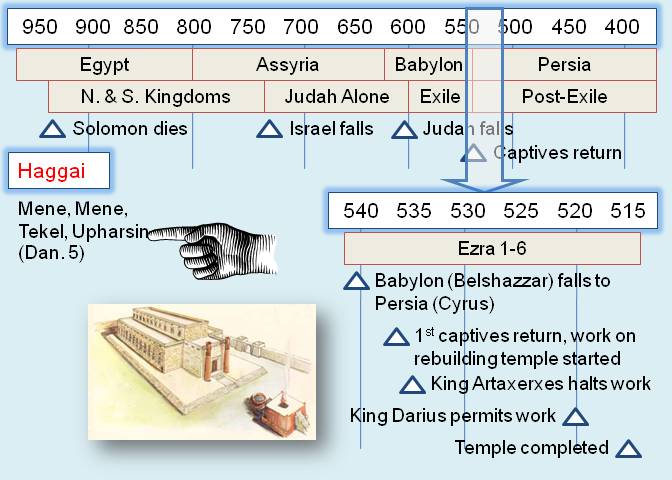A Survey of the Prophets - Haggai
|
Historical Background of the Book. The Jews had been held captive in the land of Babylon for about 60 years. Around 540 B.C., King Cyrus of the Medeo-Persian Empire displaced the Babylonians. Being favorably inclined toward the Jews, he allowed about 50,000 Jews to return to Canaan around 539 B.C. under the leadership of Zerubbabel and Joshua (Ezra 1-2). Around 536 B.C., they began rebuilding the temple which had been destroyed by the Babylonians 50 years prior (Ezra 3). However, they encountered opposition from the local inhabitants to the north, the Samaritans, Gentiles the Assyrians had placed in the area after displacing the Northern Kingdom. By decree of King Artaxerxes, Cyrus successor, construction on the temple was halted around 535 B.C. (Ezra 4).
The Author and the Audience. Around 520 B.C., the word of the Lord came to Haggai (Ezra 5:1). Little is known about him. Some scholars suggest he may have witnessed the destruction of the temple by the Babylonians. His audience was Zerubabbel, Joshua, and the Jews in Jerusalem. |
Outline/Major Themes. The overall theme of the book of Haggai is two fold: 1) the Jews have not prospered because they have neglected the rebuilding of the temple and 2) they needed to repent, get to work, and finish the job.
- Ch. 1:1-11 The call to repent and rebuild
- Ch. 1:12-15 Zerubabbel's response of repentance
- Ch. 2:1-9 Encouragement since the rebuilt temple would be filled with God's glory
- Ch. 2:10-19 The people would be restored and blessed
- Ch. 2:20-23 A promise made to Zerubabbel which has messianic overtones To the Jews' credit, they resumed construction and completed the temple about five years later (Ezra 5-6).
- The lingering consequences of sin - The overall temple complex built during Zerubbabel's time was smaller than Solomon's and had less gold and precious stones. The ark of the covenant, the 10 commandment tablets, and the mercy seat had been lost or destroyed along with the first temple. Likewise today, Christians can repent of sin, but sometimes sin has lingering consequences (e.g., weakened spiritual influence, unplanned pregnancies, an increased appetite for sinful things).
- The ends don't justify the means - The Jews did not accept help from the idolatrous Gentiles to the north. According to the New Testament pattern, congregations today are to be financed by the free-will offerings of Christians (not by selling merchandise or services to the general public nor by financial appeals to non-Christians such as bake sales, garage sales, or rummage sales).
- Always put God first (Matt. 6:24-34; Matt. 13:7, 22).
- Don't become weary in doing good by external persecution or by internal indifference (Rev. 2:4-5; Heb. 10:24-25; Gal. 6:9).

